U.S. appeals court refuses to reinstate Trump’s travel ban

SAN FRANCISCO – A federal appeals court refused Thursday to reinstate President Donald Trump’s ban on travelers from seven predominantly Muslim nations, dealing another legal setback to the new administration’s immigration policy.
In a unanimous decision, the panel of three judges from the San Francisco-based 9th U.S. Circuit Court of Appeals declined to block a lower-court ruling that suspended the ban and allowed previously barred travelers to enter the U.S. An appeal to the U.S. Supreme Court is possible.
The appeals court rejected the federal government’s claim that it should immediately re-institute the ban on national security concerns.
“The government pointed to no evidence that any alien from any of the countries named in the order has perpetrated a terrorist attack in the United States,” the panel wrote. “Rather than present evidence … the government has taken the position that we must not review its decision at all.
“We disagree.”
The court rejected the administration’s claim that it did not have the authority to review the president’s executive order.
“There is no precedent to support this claimed unreviewability, which runs contrary to the fundamental structure of our constitutional democracy,” the court said.
The panel rejected requests by the federal government to put the ban back in place with a limited geographic scope. The federal government hasn’t proposed a workable alternative and the panel said, “It is not our role to try, in effect, to rewrite the Executive Order.”
Within minutes of the court issuing its ruling, Trump responded on Twitter, “SEE YOU IN COURT, THE SECURITY OF OUR NATION IS AT STAKE!”
In Olympia, Gov. Jay Inslee responded: “Mr. President, we just saw you in court, and we beat you. What is it about this you don’t understand?”
Inslee told a hastily called press conference he hoped the federal government would pause, reconsider and leave the lower court’s order in place. But if Trump “does not back down, we won’t either.”
That sentiment was echoed by Washington Attorney General Bob Ferguson, whose office filed the lawsuit, won the temporary restraining order last Friday in U.S. District Court in Seattle and defended that ruling on Tuesday.
“No one is above the law, not even the president,” Ferguson said in a news release minutes after the ruling was available. “The president should withdraw this flawed, rushed and dangerous Executive Order which caused chaos across the country.”
U.S. District Judge James Robart halted the ban temporarily after Washington and Minnesota sued. The states argued the ban harmed individuals, businesses and universities. Citing Trump’s campaign promise to stop Muslims from entering the U.S., they said the ban unconstitutionally blocked entry to people based on religion.
Justice Department lawyers appealed to the 9th Circuit, arguing that the president has the constitutional power to restrict entry to the U.S. and that the courts cannot second-guess his determination that such a step was needed to prevent terrorism.
Both sides faced tough questioning during an hour of arguments Tuesday conducted by phone – an unusual step – and broadcast live on cable networks, news websites and social media. It attracted a huge audience.
The judges hammered away at the administration’s claim that the ban was motivated by terrorism fears, but they also challenged the states’ argument that it targeted Muslims.
Robart temporarily halted the ban after determining that the states were likely to win the case and had shown that the ban would restrict travel by the states’ residents, damage their public universities and reduce their tax base. That put the executive order on hold while the lawsuit works its way through the courts.
After that ruling, the State Department quickly said people from the seven countries – Iran, Iraq, Libya, Somalia, Sudan, Syria and Yemen – with valid visas could travel to the U.S. The decision led to tearful reunions at airports around the country.
The Supreme Court has a vacancy, and there’s no chance Trump’s nominee, Neil Gorsuch, will be confirmed in time to take part in any consideration of the ban.
The ban was set to expire in 90 days, meaning it could run its course before the court would take up the issue. The administration also could change the order, including changing its scope or duration.
Staff writer Jim Camden and the Associated Press contributed to this report.